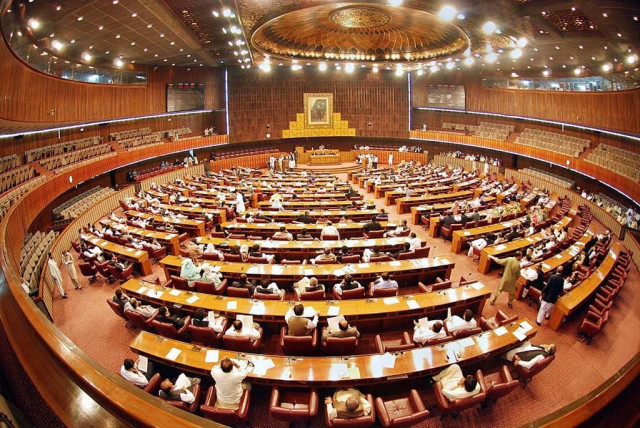Islamabad:
The legislation on a new bill, the prohibition of obscenity and vulgarity in the 2025 digital media bill, is expected in the next session of the National Assembly. Introduced by PPP MNA Dr. Syeda Shahida Rehmani, the bill seeks to stop the obscene online content and implies sanctions ranging from RS100,000 to RS1 billion.
The proposed bill defines “digital media” and “prohibited content” that includes online and offline platforms, applications, social networks and transmission services.
It will be applied to all content in the form of images, audio, videos, multimedia, movies, web series, animated sketches, dramas, songs, short videos, live broadcasts or visible ads through digital media.
The forbidden content includes sexual conversations, extramarital relationships, sexual immorality, semi -naked outfit, drug use, public morals, religious wounds, mocking the hijab, purdah or the family system, ridiculing religious figures and violating Pakistan’s ideology or cultural values.
According to the bill, an authority, a board and a court will be established. The National Agency for Cyber Crime Investigation (NCCIA) will investigate and be processed under the Electronic Crime Prevention Law, 2016.
The Board will have eight members: two religious academics, a woman and a man, two psychologists, a civil society member, a legal expert of the media, a media professional responsible for confiscating the forbidden content and a federal government representative as president.
The Court will be composed of three members: a person qualified to be a judge of the Superior Court, a media professional and a IT expert, who will listen and decide cases related to digital media.
The Board will have the authority to prohibit the prohibited content, make amendments, take the action of Suo motu against the obscene material and recommend fines for violations, while the authority will act according to the recommendations of the Board.
Penalties under the bill include prison of one year and a fine of RS500,000 for the crime for the first time and the three -year prison and the fine of RS5 million for the second crime. Crimes related to religion, women, children or the family system will imply five -year prison and a fine of RS10 million.
Digital media platforms and service providers must inform all the content loaded in Pakistan to the Board within 15 days and, to the notice, block the prohibited content within 24 hours and retain the record for three years.
RS50 million will be imposed on platforms for the first violation and the fine of RS100 million for the second violation. Repeated violations will give rise to the cancellation of the license and the blocking of the service.
All crimes under this law will not be blank and not composed. The bill is expected to be approved by the NA after deliberation in the corresponding Permanent Committee.
The PECA, a law promulgated in 2016, was approved by the lower and higher houses, aimed at addressing cybernetic crime and regulating electronic communication in Pakistan. It was intended to combat online crimes such as piracy, data theft and cyberbullying. Many journalists and media organizations have expressed concern regarding their implications on freedom of the press and freedom of expression.
“The Government has to learn the lessons, since it was previously used against the same party, which had approved the law in a hurry,” said Mazhar Abbas, main member of Pfuj.




